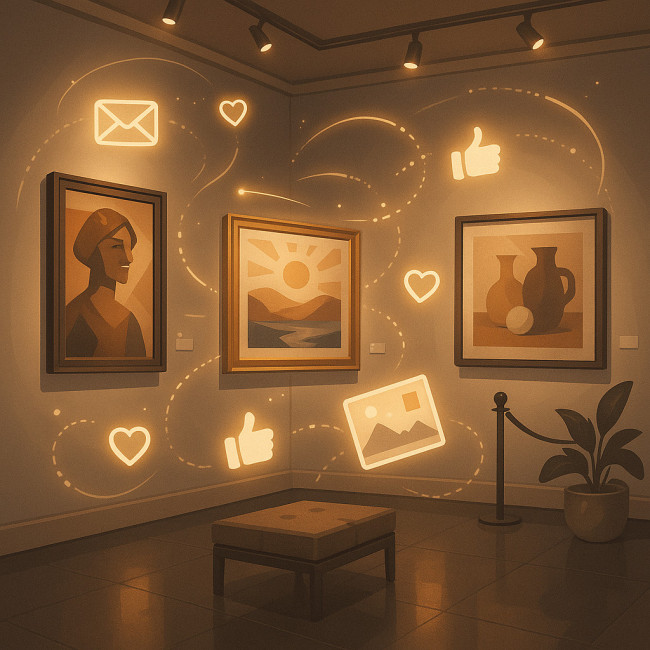Follow-up strategy after openings: emails that turn admirers into clients
The gallery lights have dimmed, the guests have gone home – now the real business begins. A smart follow-up strategy after openings converts casual admirers into paying collectors, curators or brand partners. This guide shows you how to craft persuasive follow-up emails, schedule them for maximum impact and track conversions without sounding pushy.
Why a follow-up strategy after openings matters
Collectors attend dozens of vernissages each season. Without a timely reminder, your artwork blurs into the background noise. A structured follow-up strategy after openings delivers:
- Recall – vivid images and stories jog memories formed during the event.
- Trust – practical information about pricing, shipping and certificates proves professionalism.
- Momentum – clear next steps transform admiration into concrete buying decisions.
The psychology behind post-event emails
Stanford research shows that intent to purchase peaks within 48 hours of an art encounter, then drops by nearly 50 % after seven days. Timely messaging leverages that window before excitement fades.
Three-email blueprint that converts
Use this proven sequence to maximise results while maintaining a respectful tone.
-
Email #1 – Thank-you & highlight (send within 24 h)
- Subject line: “Great meeting you at [Exhibition Name] – here's the promised catalogue”
- Body: Express gratitude, attach a high-resolution PDF or link to an interactive video asset showcasing key works, and invite questions.
-
Email #2 – Story & social proof (send day 3–4)
- Share the narrative behind one signature piece and include a brief testimonial or press quote.
- Add a gentle prompt to book a private viewing or virtual walkthrough.
-
Email #3 – Limited offer & clear CTA (send day 7)
- Offer early-collector pricing, framed upgrades or complimentary shipping valid for 72 h.
- Embed a “Reply Yes” shortcut to remove friction.
Crafting irresistible copy
| Element | Do | Don't |
|---|---|---|
| Subject line | “Your favourite neon piece – now in your inbox” | “Following up after event” |
| Opening | Reference a specific artwork or conversation | Generic “Dear Sir/Madam” greeting |
| Body | One clear message, bullets for logistics | Dense paragraphs packed with jargon |
| CTA | “Schedule a 10-min call” button | Multiple conflicting requests |
Timing & automation tools
Batched messages can feel robotic. Use merge tags for first names and reference timestamps from your sign-in sheet. Platforms like MailerLite or HubSpot let you respect inbox etiquette by pausing sends to anyone who already replied.
Segmentation tips
- Collectors vs. curators – curators need loan terms; collectors need payment plans.
- Local vs. international – highlight customs brokerage only for the latter.
- Press contacts – include fresh angles and high-resolution press images.
Visual proof: why the first follow-up matters
Tracking success without drowning in data
Focus on three metrics: open rate, reply rate and conversion (invoice sent or commission signed). Connect your CRM to a lightweight dashboard. If you use directory traffic, pair email tags with lead-nurture workflows to map a full buyer journey.
Troubleshooting low engagement
- Low opens – test sender name variations and shorter subjects.
- Low replies – add a clickable phone number for instant WhatsApp conversation.
- Low conversions – showcase framing options, installation shots or link to an event collaboration case study that proves ROI.
Integrate follow-up emails with other channels

An omnichannel approach multiplies touchpoints and creates a reinforced memory loop that reignites the excitement guests felt during the opening. By weaving together email, social media, direct messaging and even tactile mailers, you guide prospects through a seamless narrative that references previous interactions, making each new contact feel like the next chapter in a personalised story rather than a disconnected advertisement. This orchestrated pacing sustains curiosity, prevents the event from fading into the season's noise and gently nudges collectors toward a confident purchasing decision.
- Social recap reel posted 12 h after the opening, tagged recipients receive an instant reminder.
- Personalised DM referencing the reel for any high-value lead who hasn't opened email #1.
- Printed postcard for top 5 % prospects – tangibility can boost perceived value.
Mini-quiz: are your follow-up emails gallery-ready?
FAQ
- What if I didn't collect email addresses at the opening?
- Use the guest book or event registration platform to retrieve contact data. For missing emails, send a polite Instagram DM asking permission to continue the conversation.
- How many follow-ups are too many?
- Three well-timed messages plus a final “check-in” months later are usually sufficient. If no engagement occurs, move the contact to a low-touch newsletter list.
- Should prices be included in the first email?
- Yes, when transparency is essential for fast decisions. If your pricing varies, provide a range and invite a call for personalised quotes.
- How do I handle international shipping questions?
- Include a brief FAQ link or bullet note about duties, packaging and insurance, then offer to arrange a courier quote within 24 hours.
Take action now
Draft your first follow-up email template today, schedule your sequence and watch admirers become collectors. Ready to streamline the entire journey? Explore our guide on turning directory clicks into contracts and keep your pipeline healthy all year.











